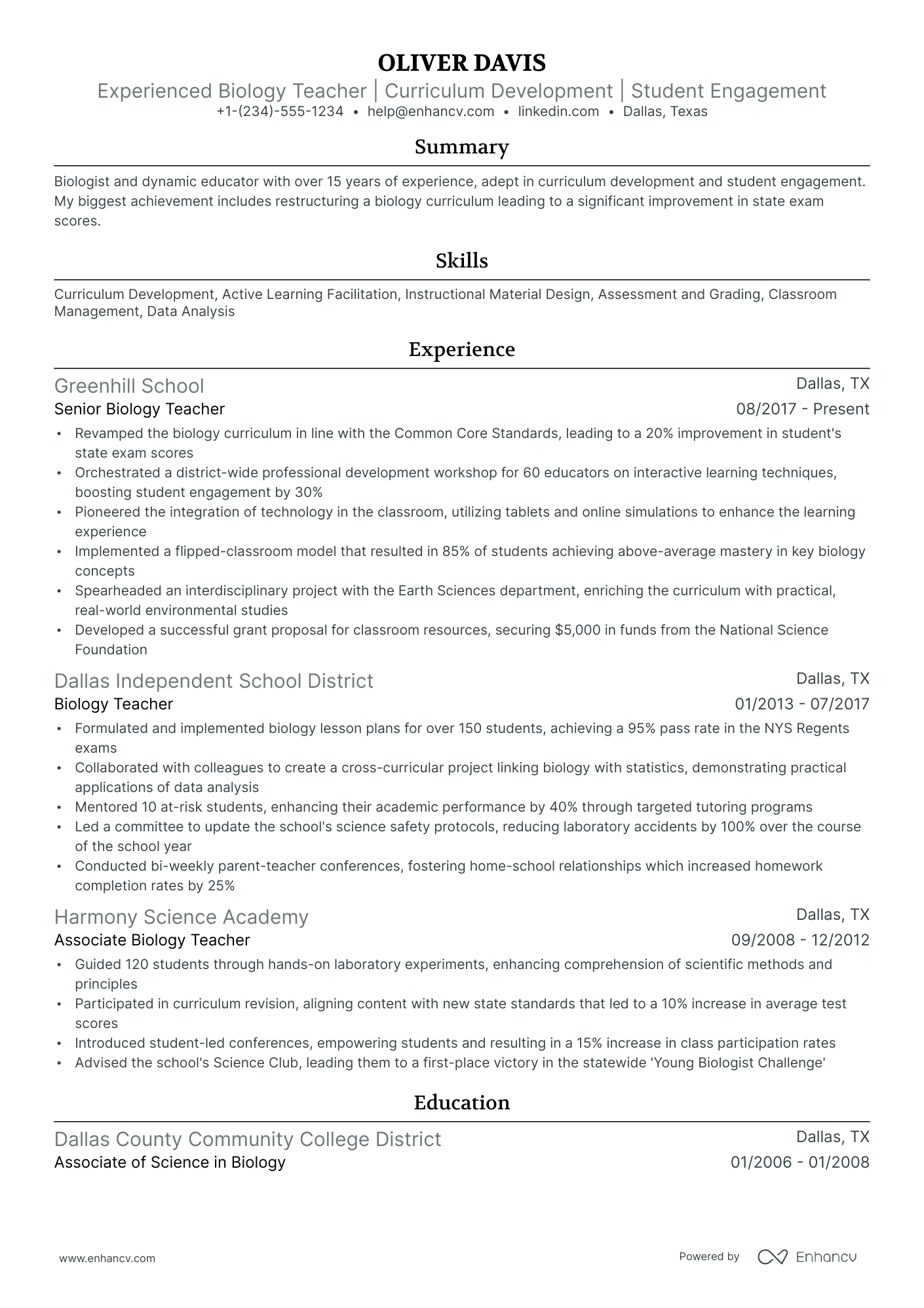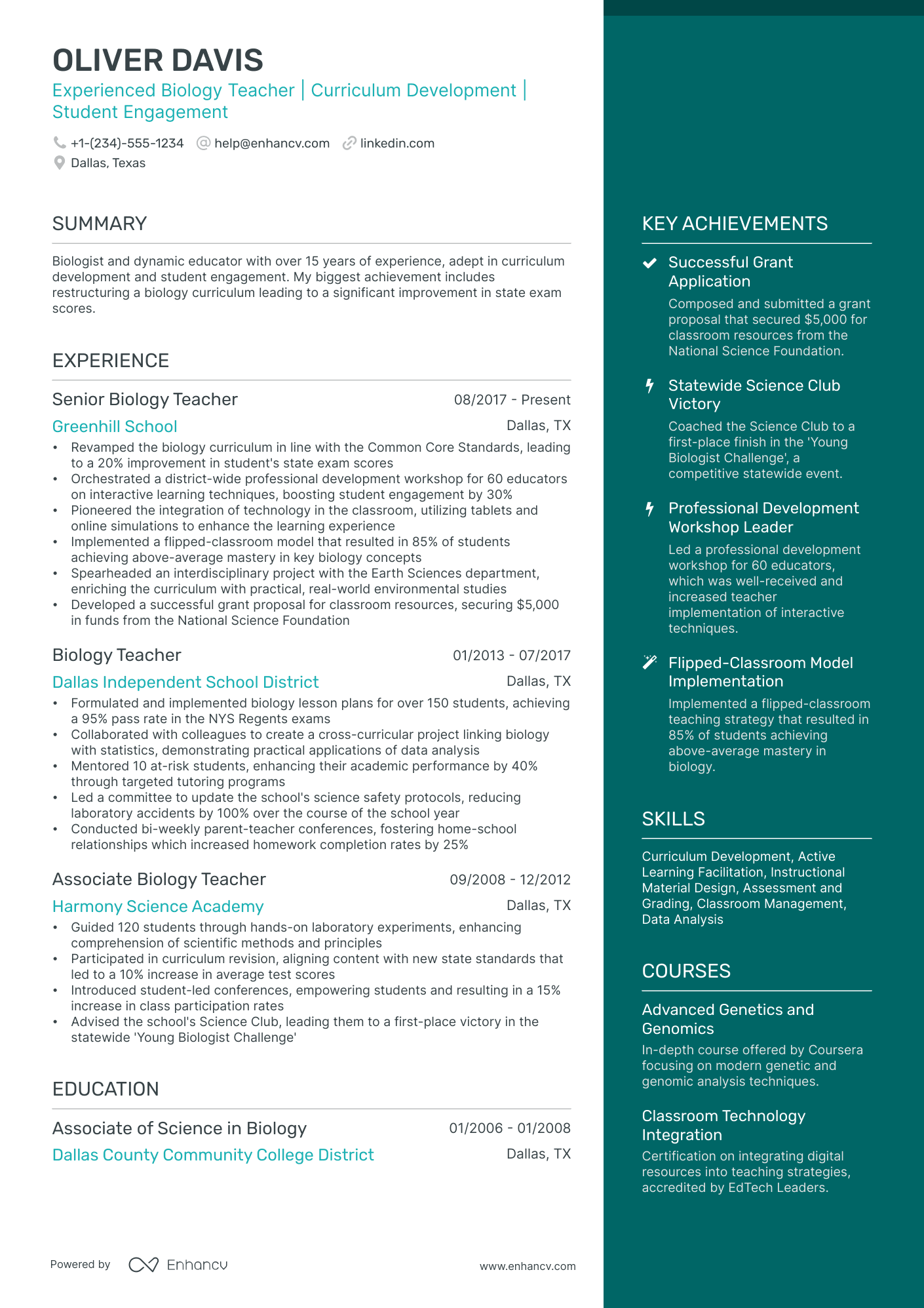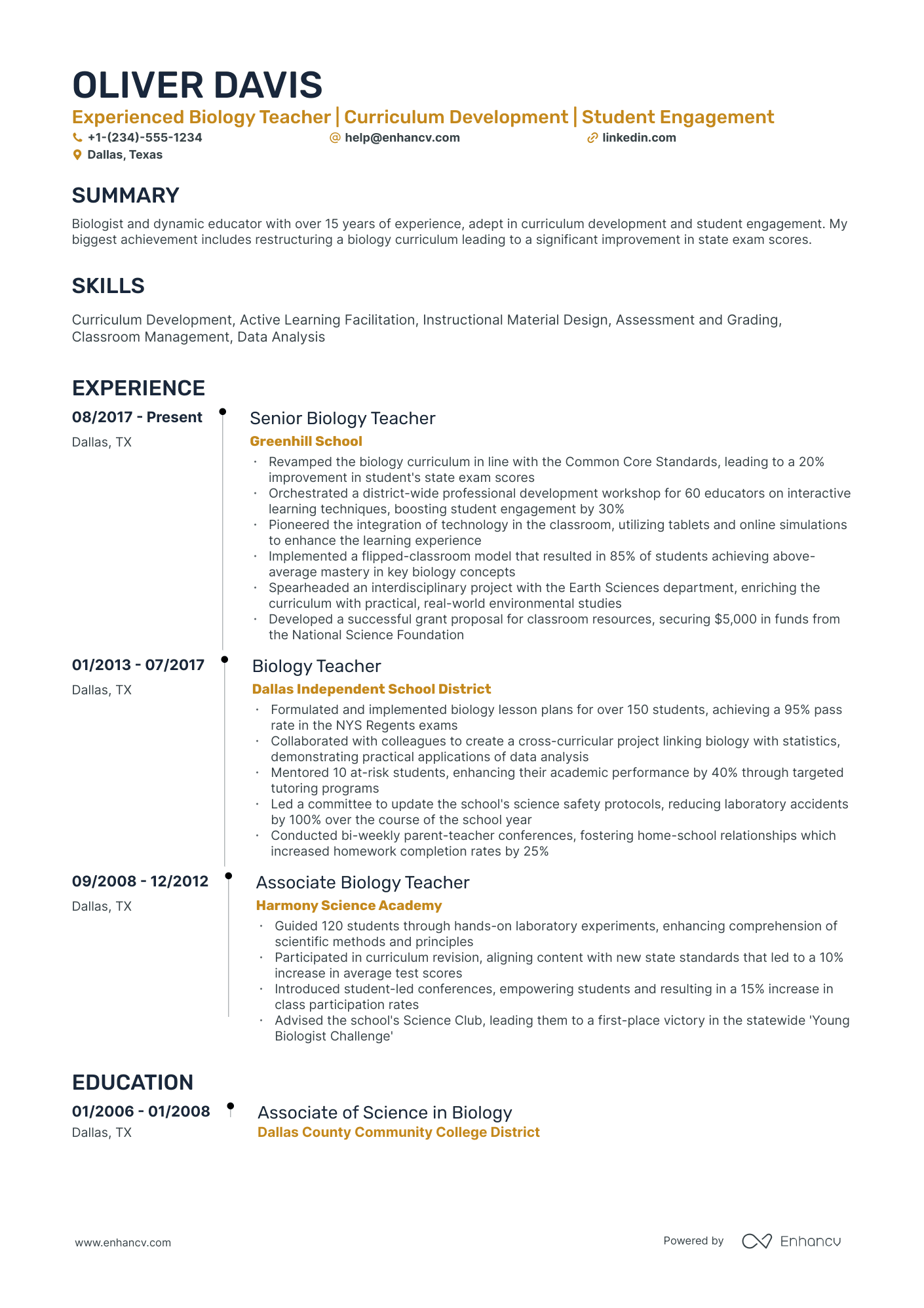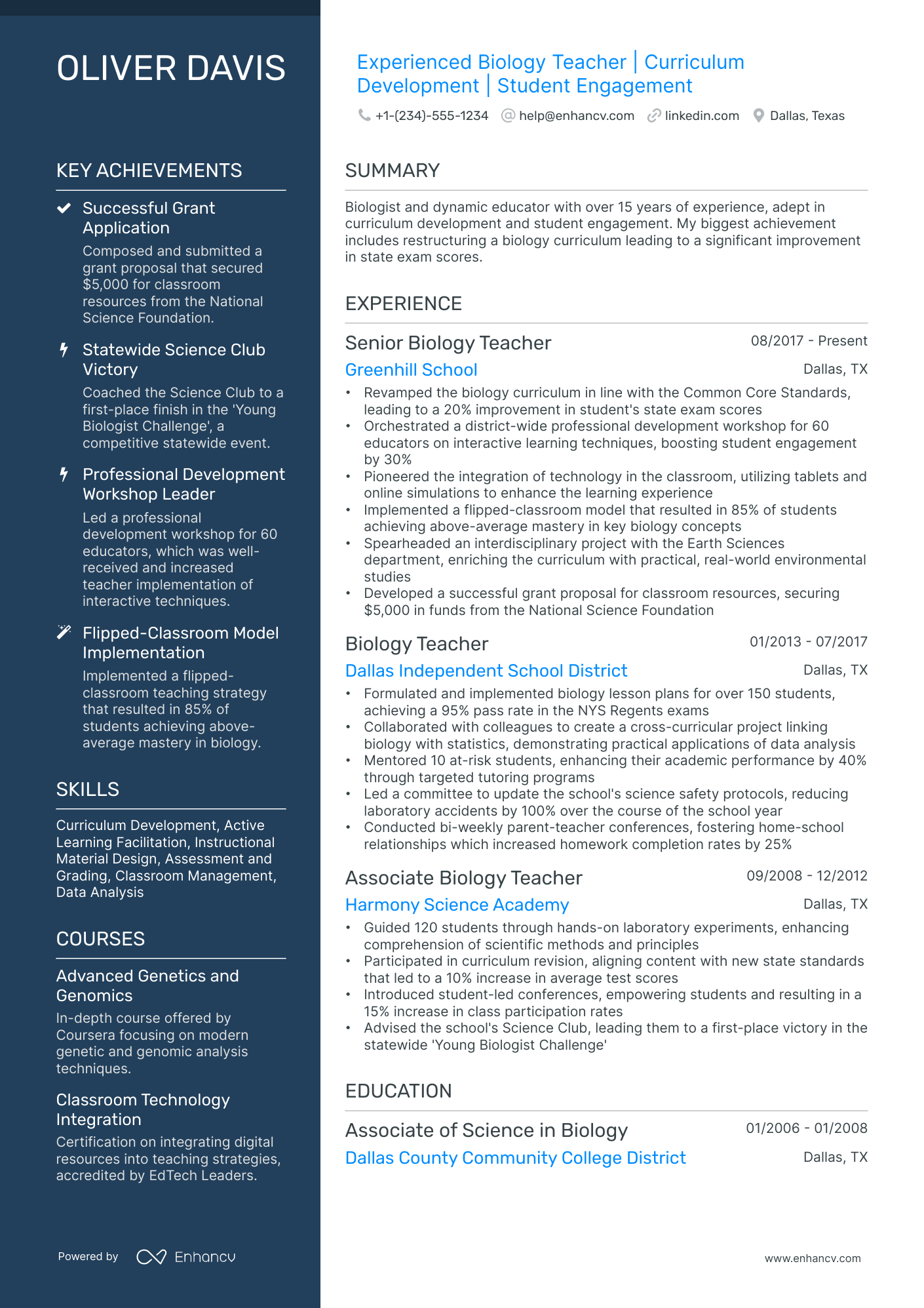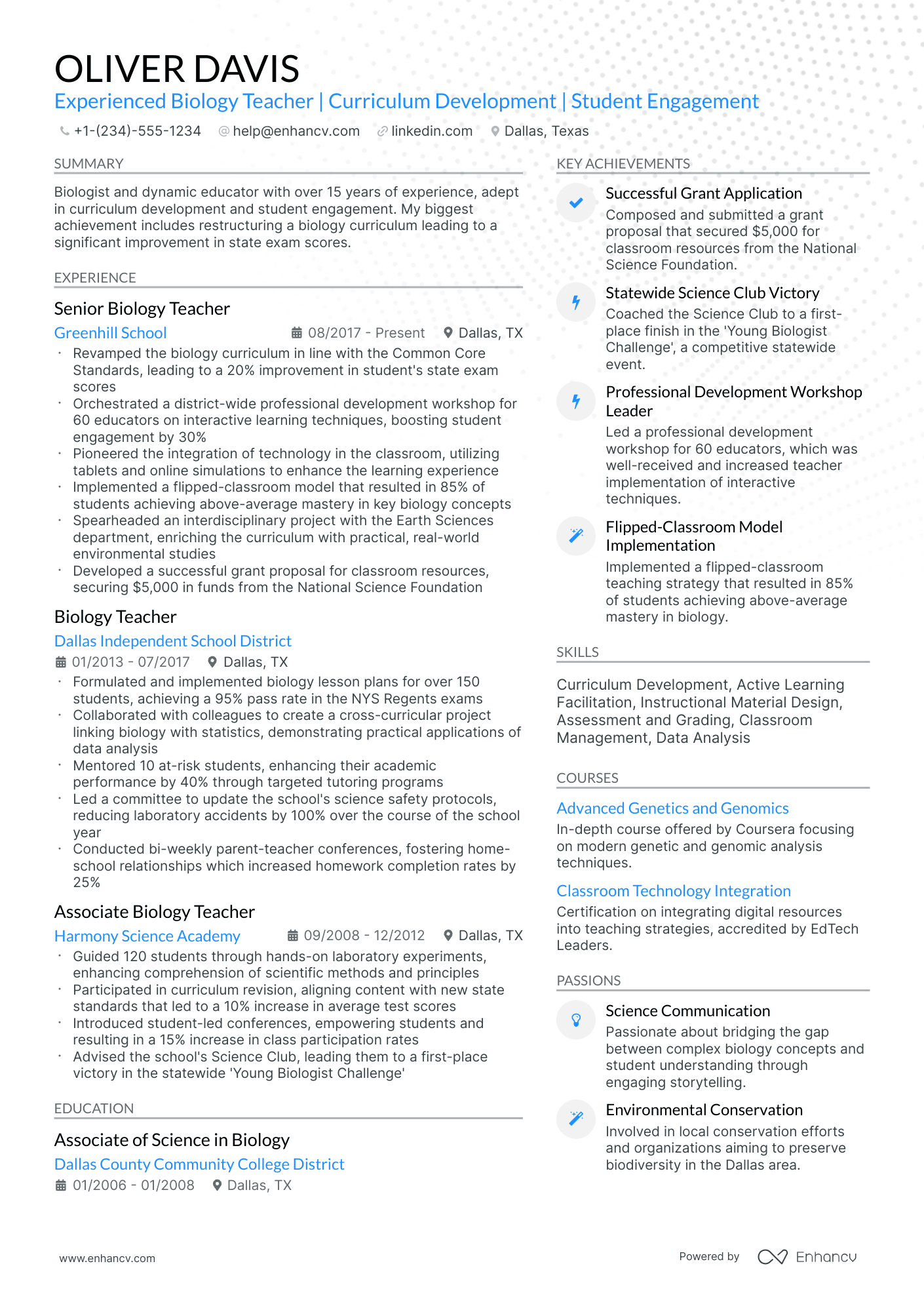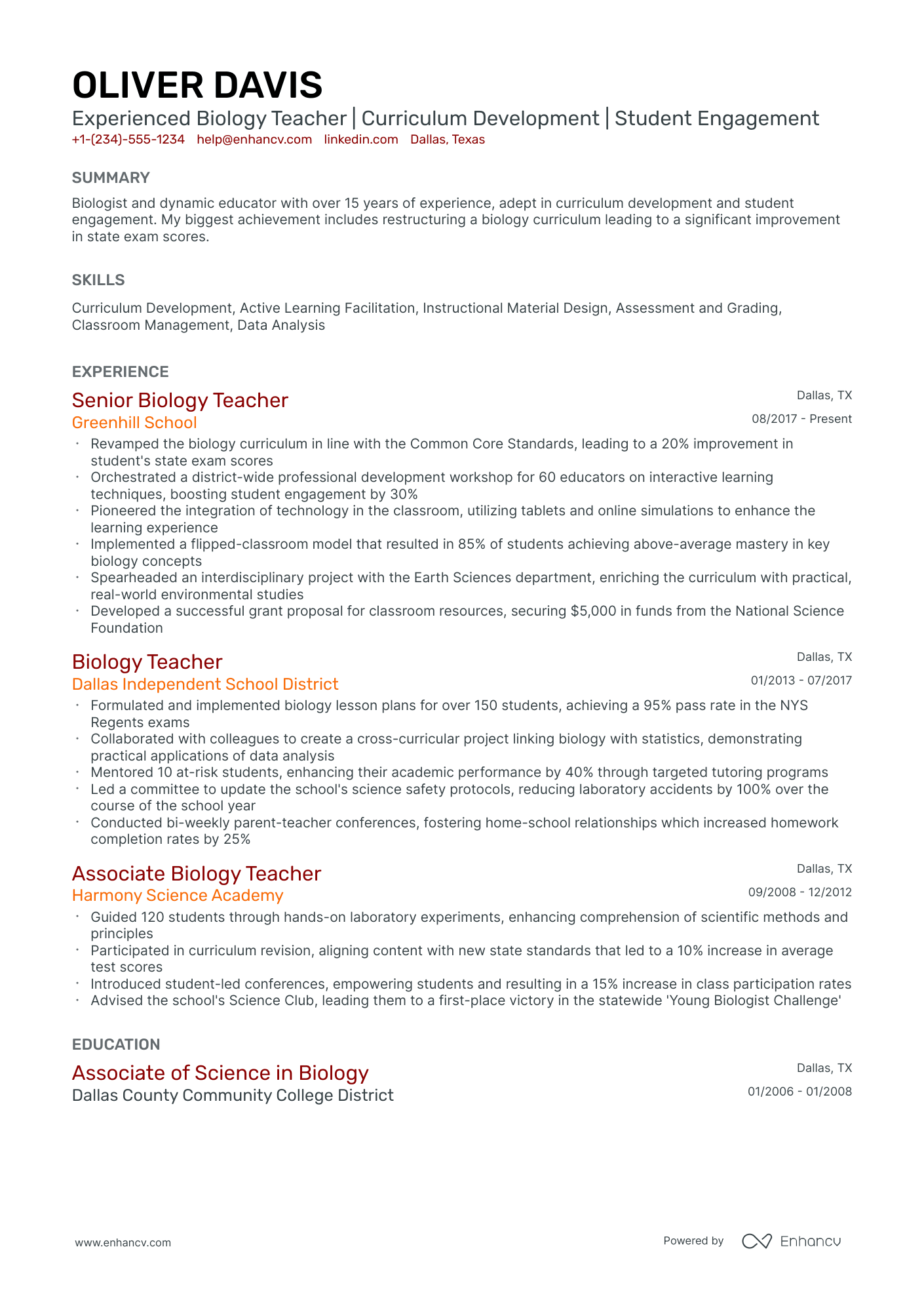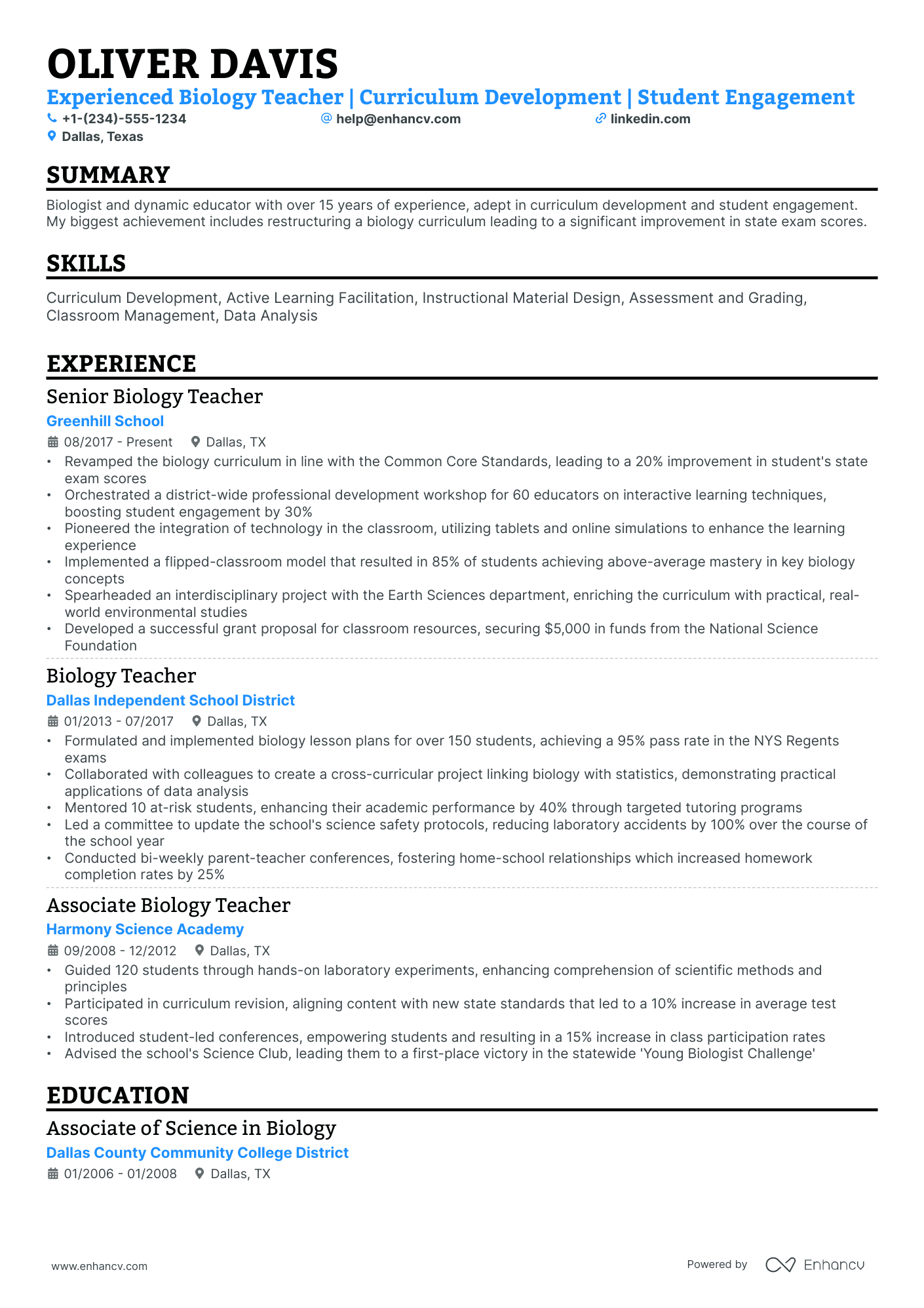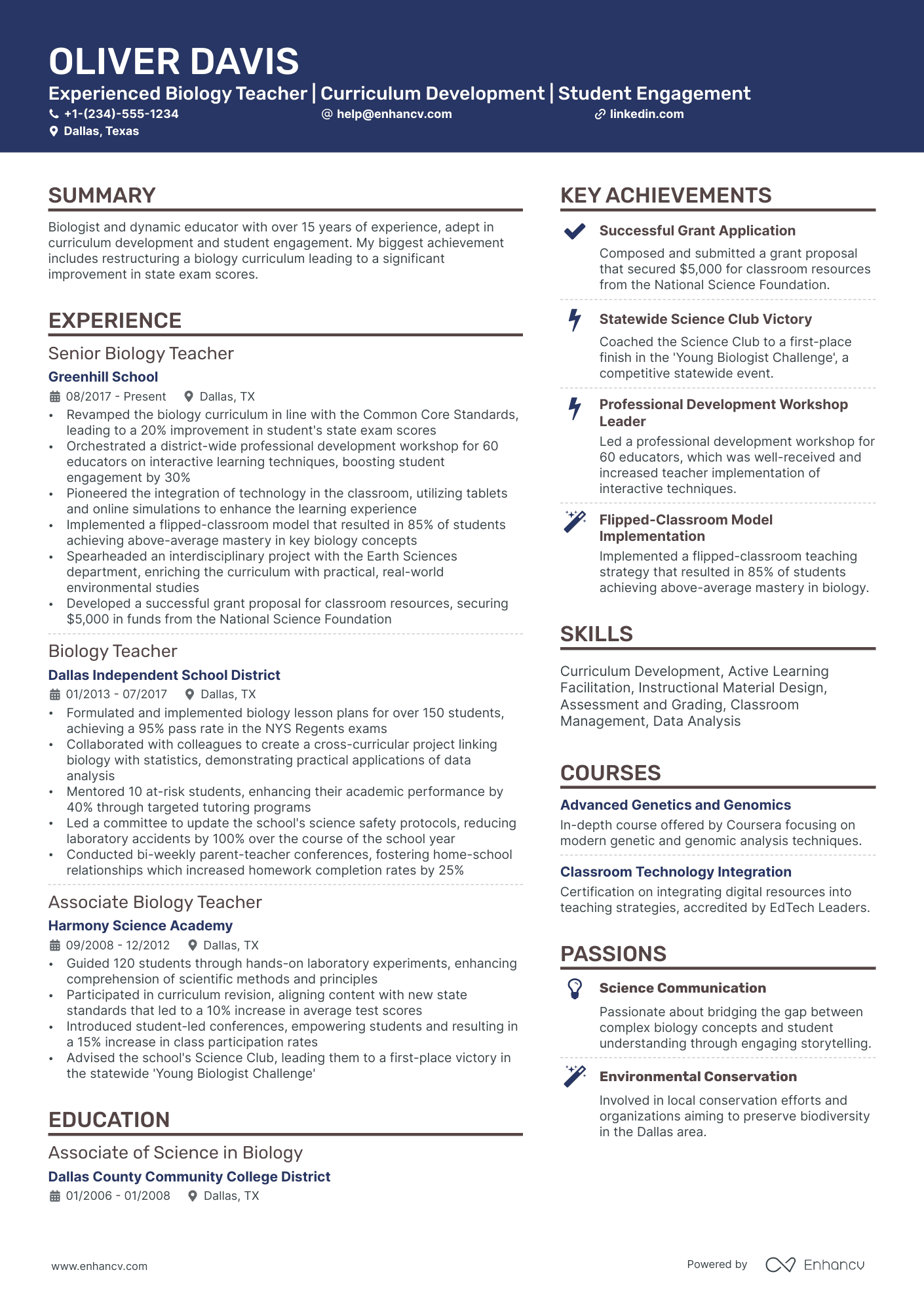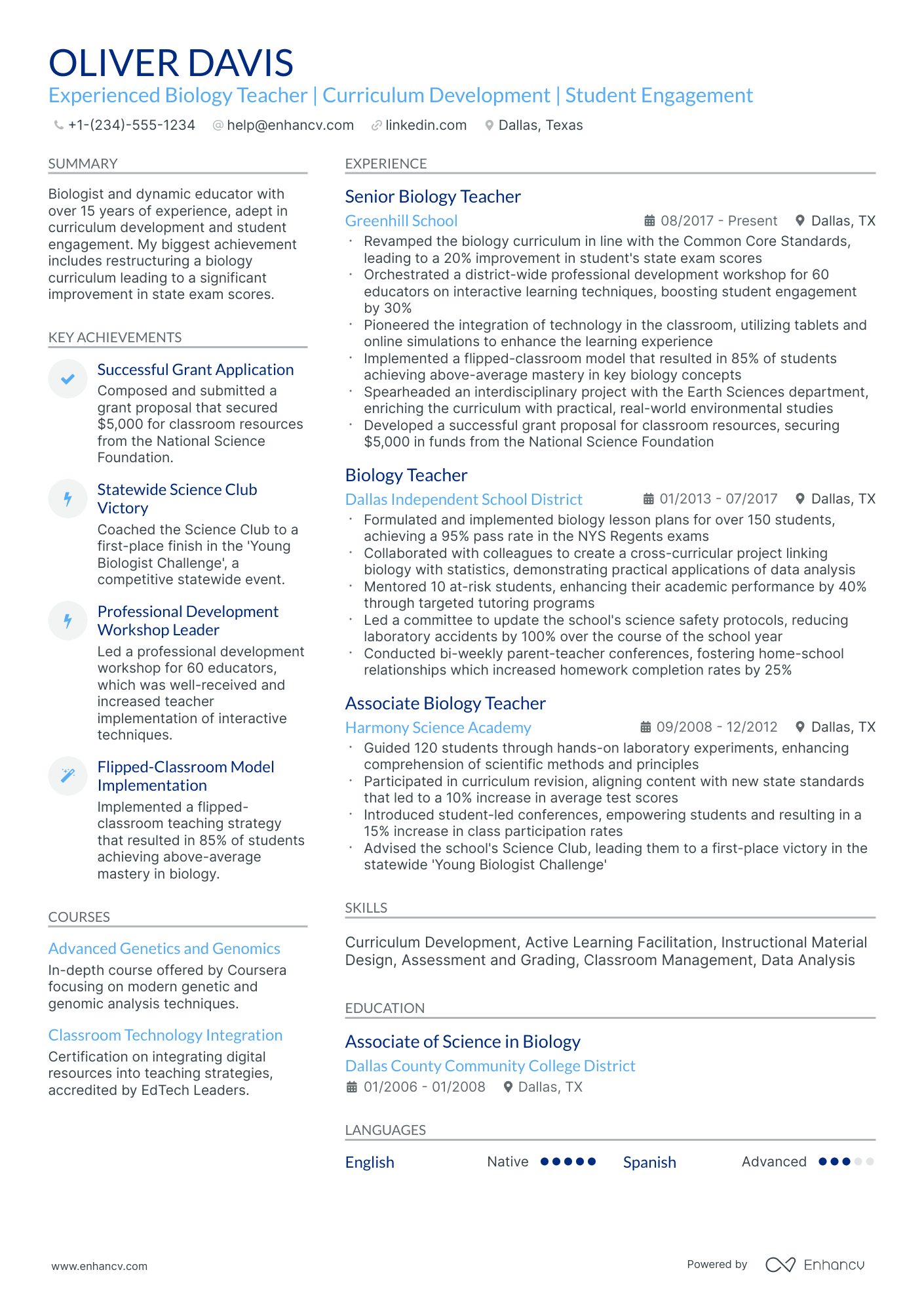As a biology teacher crafting your resume, articulating your diverse classroom activities and laboratory management skills can be a daunting challenge. Our comprehensive guide offers strategies and examples to help you effectively showcase your unique teaching experiences and scientific expertise, ensuring your application stands out to potential employers.
- Apply best practices from professional resumes to spotlight your application;
- Quantify your professional experience with achievements, career highlights, projects, and more;
- Write an eye-catching biology teacher resume top one-third with your header, summary/objective, and skills section;
- Fill in the gaps of your experience with extracurricular, education, and more vital resume sections.
We've selected, especially for you, some of our most relevant biology teacher resume guides. Getting you from thinking about your next career move to landing your dream job.
Best practices for the look and feel of your biology teacher resume
Before you even start writing your biology teacher resume, first you need to consider its layout and format.
What's important to keep in mind is:
- The reverse-chronological resume is the most widely used format to present your experience, starting with your latest job.
- Your biology teacher resume header needs to include your correct, professional contact details. If you happen to have a professional portfolio or an updated LinkedIn profile, include a link to it.
- Ensure your resume is no longer than two pages - you don't have to include irelevant experience on your resume just to make it look longer.
- Unless specified otherwise, submit your resume in the most popular format, the PDF one, as this will ensure your biology teacher resume isn't altered.
Think about the market’s preferences – a Canadian resume, for instance, could have a different layout.
Upload & Check Your Resume
Drop your resume here or choose a file. PDF & DOCX only. Max 2MB file size.
PRO TIP
Showcase any ongoing or recent educational efforts to stay updated in your field.
The five (plus) definite sections your resume for a biology teacher job should include are:
- Header with your headline, contact details, and/or a preview of your work
- Summary (or objective) to pinpoint how your success aligns with the role
- Experience with bullets of your most relevant achievements in the field
- Skills to integrate vital job requirements (both technical and personal)
- Your further dedication to the field, showcased via relevant higher education and/or certifications
What recruiters want to see on your resume:
- Demonstrated knowledge in biology concepts, theories, and laboratory practices.
- Experience with designing and implementing engaging curriculum and lab activities that align with state education standards.
- Ability to incorporate technology and modern scientific tools in the classroom to enhance learning.
- Strong classroom management skills specific to maintaining safety and organization in a lab setting.
- Professional development or continuing education in biology or science education to stay current in the subject matter.
Experts' advice on writing your biology teacher resume experience
While the excitement and motivation for writing your biology teacher resume was present in the first hour (or so), you now find yourself staring at the blank page.
The resume experience section is the one that allows you to make a memorable impression by matching job requirement with your past jobs and accomplishments.
To help you write this resume section, here are four mistakes you need to avoid:
- Listing every job you have had so far, including the irrelevant ones. Before that, consider each of your past roles based on relevancy to the role. It may be the case that the job you had 15 years ago may have taught you invaluable skills that are appropriate for the role;
- Including irrelevant work experience items. Those are past jobs that aren't linked with the role you're applying for (or so they seem). Consider how your past jobs will serve your professional presentation: will they be filling in a gap in your work history, or just taking up space?
- Focusing on responsibilities instead of accomplishments. Your biology teacher resume shouldn't just be telling recruiters what you did in the past - as it's most often the case that candidates have had similar responsibilities. But, rather, the experience section should showcase the success you've attained in each past role, thanks to your unique skill set;
- Consider listing just your professional experience. Any role you've had in the past - e.g. volunteering, internships, etc. - can make it into your biology teacher resume experience section. Make sure to include it alongside numbers and results.
Two more things you need to remember about your resume experience section.
The first are keywords. Or those specific job requirements that are crucial for the role . Ensure you've integrated them across your experience section to get sorted closer to the ideal candidate profile by the Applicant Tracker System (ATS).
The second are action verbs. Each of your experience bullets should start with a strong action verb, followed by your specific skill and your on the job achievements. Follow this formula to hint to recruiters what your unique value as a professional is.
Still with us? In the next section, we will show you how industry-leading professionals have avoided the four most common mistakes, while integrating keywords and action verbs in their experience section.
- Developed and implemented a biology curriculum for grades 9-12, aligning teaching methods with state standards and increasing student performance by 20%.
- Pioneered the use of interactive lab experiments, enhancing student engagement and practical understanding of complex biological concepts.
- Mentored 5 new teachers, providing guidance and strategies for effective classroom management and curriculum planning.
- Increased AP Biology pass rates by 25% through rigorous coursework and targeted student support initiatives.
- Collaborated with the Science Department to secure a $50,000 grant for new laboratory equipment, which expanded research opportunities for students.
- Authored and published an extensive supplemental guide for the AP Biology curriculum used by over 300 students district-wide.
- Orchestrated a school-wide science fair, involving over 500 students and facilitating collaboration between different grade levels and scientific disciplines.
- Designed a digital classroom environment using Moodle, increasing resource accessibility and enabling the seamless continuation of instruction during unforeseen school closures.
- Led a summer science program that boosted student interest in STEM careers by 30% through partnerships with local universities and businesses.
- Introduced a Next Generation Science Standards (NGSS)-aligned curriculum, leading to a 15% improvement in state test scores over two years.
- Spearheaded an initiative to incorporate biotechnology modules into the curriculum, providing hands-on experience with CRISPR and other cutting-edge techniques.
- Organized annual field trips to local wetlands, promoting environmental awareness and conservation efforts among students.
- Developed a differentiated instruction plan that accommodated multiple learning styles, resulting in a 10% increase in overall student achievement.
- Supervised the Biology Club, leading students in regional science competitions and achieving three consecutive first-place wins.
- Implemented a peer tutoring program that improved passing rates by 18% for students at risk of failing.
- Integrated technology into the biology curriculum by utilizing tablets and educational apps, which fostered a 20% increase in student engagement.
- Conducted annual STEM workshops for local elementary schools, helping to instill a passion for science in younger students.
- Designed and implemented an interdisciplinary project-based learning initiative that connected biology with environmental science and ethics.
- Revitalized the biology curriculum with an emphasis on hands-on learning, leading to a 40% reduction in student absenteeism.
- Engaged in professional development programs focused on Next Generation Science Standards, applying these methodologies to enhance curriculum effectiveness.
- Facilitated student-led community projects on sustainability, culminating in a school-wide recycling program that diverted 2 tons of waste annually.
- Led a team of biology teachers in piloting a new, collaborative teaching model that boosted cross-disciplinary integration and student critical thinking skills.
- Successfully implemented a formative assessment framework that personalized learning paths for students, improving test scores by an average of 12%.
- Co-authored a district-wide study on effective science instruction techniques, which was subsequently adopted by 10 surrounding school districts.
The following content includes information from "O*NET OnLine" by the U.S. Department of Labor, Employment and Training Administration (USDOL/ETA). Used under the CC BY 4.0 license. The data represents the top responsibilities present on the task lists for biology teacher professionals.
Top Responsibilities for Biology Teacher:
- Evaluate and grade students' class work, laboratory work, assignments, and papers.
- Prepare and deliver lectures to undergraduate or graduate students on topics such as molecular biology, marine biology, and botany.
- Plan, evaluate, and revise curricula, course content, and course materials and methods of instruction.
- Prepare materials for laboratory activities and course materials, such as syllabi, homework assignments, and handouts.
- Initiate, facilitate, and moderate classroom discussions.
- Supervise students' laboratory work.
- Keep abreast of developments in the field by reading current literature, talking with colleagues, and participating in professional conferences.
- Maintain student attendance records, grades, and other required records.
- Compile, administer, and grade examinations, or assign this work to others.
- Supervise undergraduate or graduate teaching, internship, and research work.
Quantifying impact on your resume
- Include the number of students taught per semester to demonstrate classroom management and scale of teaching experience.
- List the percentage increase in student test scores or grades to highlight teaching effectiveness and positive outcomes.
- Mention the total number of biology labs or projects supervised to showcase hands-on teaching expertise and curriculum development.
- Specify the amount of educational content created, such as lesson plans or assessments, to illustrate contributions to resource development.
- Document the number of professional development workshops or seminars led to emphasize leadership and continuous learning.
- State the funding amount of any grants or budgets successfully obtained for scientific research or classroom resources.
- Quantify the number of teacher trainings attended or certifications earned to show commitment to professional growth.
- Report the number of successful student entries in science fairs or competitions to demonstrate student engagement and success.
Action verbs for your biology teacher resume
What if my biology teacher experience doesn't match the requirements?
You've just graduated from college and may have no real world job experience . What should you include within your resume then?
Instead of making up information or adding irrelevant past jobs (e.g. your on-campus work during freshman year), you can:
- Shift the focus from your professional experience to your community impact with your volunteer work. This would showcase numerous soft skills you've built over time (e.g. interpersonal communication);
- Highlight the projects you've completed, as part of your coursework, or, on your own. Thus, you will align your technical background with recruiters' requirements;
- Consider spotlighting your transferrable skills. Or, what lessons and talents your current professional and personal experience has taught you and how they could benefit your potential employers;
- Even if you've had a few months of internship experience, that is relevant for the role, make sure to include this. Recruiters do care about the years of experience you happen to have, but, at the end of the day, your profile would also be assessed based on role alignment.
Recommended reads:
PRO TIP
Listing your relevant degrees or certificates on your biology teacher resume is a win-win situation. Not only does it hint at your technical capabilities in the industry, but an array of soft skills, like perseverance, adaptability, and motivation.
Biology teacher resume skills section: writing about your hard skills and soft skills
Recruiters always care about the skill set you'd bring about to the biology teacher role. That's why it's a good idea to curate yours wisely, integrating both hard (or technical) and soft skills. Hard skills are the technology and software you're apt at using - these show your suitability for the technical aspect of the role. They are easy to track via your experience, certifications, and various resume sections. Your soft skills are those personality traits you've gained over time that show how you'd perform in the specific team, etc. Soft skills are more difficult to qualify but are definitely worth it - as they make you stand out and show your adaptability to new environments. How do you build the skills section of your resume? Best practices point that you could:
- Include up to five or six skills in the section as keywords to align with the advert.
- Create a specific technical skills section to highlight your hard skills aptitude.
- Align the culture of the company you're applying to with your soft skills to determine which ones should be more prominent in your skills section.
- Make sure you answer majority of the job requirements that are in the advert within your skills section.
A biology teacher's resume requires a specific skill set that balances both industry-specific hard skills with personal, soft skills. Discover the perfect mix for the biology teacher role from our list:
Top skills for your biology teacher resume:
Laboratory Equipment Proficiency
Microscopy Techniques
Bioinformatics Software
Genetics Analysis Tools
Statistical Analysis Software
Environmental Monitoring Tools
Dissection Equipment
Biology Simulation Software
Data Visualization Tools
Curriculum Development Software
Communication Skills
Patience
Adaptability
Critical Thinking
Collaboration
Organizational Skills
Creativity
Empathy
Problem-Solving
Motivational Skills
Next, you will find information on the top technologies for biology teacher professonals from "O*NET OnLine" by the U.S. Department of Labor, Employment and Training Administration (USDOL/ETA). Used under the CC BY 4.0 license.
Top technologies for Biology Teacher’s resume:
- IBM SPSS Statistics
- The MathWorks MATLAB
- Learning management system LMS
- Moodle
- Google Docs
- Microsoft Word
PRO TIP
If the certificate you've obtained is especially vital for the industry or company, include it as part of your name within the resume headline.
Certifications and education: in-demand sections for your biology teacher resume
Your academic background in the form of certifications on your resume and your higher degree education is important to your application.
The certifications and education sections pinpoint a variety of hard and soft skills you possess, as well as your dedication to the industry.
Add relevant certificates to your biology teacher resume by:
- Add special achievements or recognitions you've received during your education or certification, only if they're really noteworthy and/or applicable to the role
- Be concise - don't list every and any certificate you've obtained through your career, but instead, select the ones that would be most impressive to the role
- Include the name of the certificate or degree, institution, graduation dates, and certificate license numbers (if possible)
- Organize your education in reverse chronological format, starting with the latest degree you have that's most applicable for the role
Think of the education and certification sections as the further credibility your biology teacher resume needs to pinpoint your success.
Now, if you're stuck on these resume sections, we've curated a list of the most popular technical certificates across the industry.
Have a look, below:
The top 5 certifications for your biology teacher resume:
- National Board Certified Teacher (NBCT) - National Board for Professional Teaching Standards
- Professional Educator License (PEL) - State Department of Education
- Science Teacher Certification - American Board for the Certification of Teacher Excellence
- Biology Endorsement - State Department of Education
- Certified Science Teacher (CST) - National Science Teachers Association
The content below includes information from "O*NET OnLine" by the U.S. Department of Labor, Employment and Training Administration (USDOL/ETA). Used under the CC BY 4.0 license. The data represents the top associations for biology teacher professionals.
Top US associations for a Biology Teacher professional
- American Association for the Advancement of Science
- American Physiological Society
- American Society for Microbiology
- American Society of Ichthyologists and Herpetologists
- Association for Biology Laboratory Education
PRO TIP
Listing your relevant degrees or certificates on your biology teacher resume is a win-win situation. Not only does it hint at your technical capabilities in the industry, but an array of soft skills, like perseverance, adaptability, and motivation.
Recommended reads:
Your biology teacher resume top one third: choosing between a resume summary or an objective
The top third of your resume is crucial, as recruiters might focus only on this section rather than reading the entire document. Therefore, it's important to carefully decide whether to include a resume summary or an objective.
- The resume summary encapsulates your most significant experiences, key achievements, and skills in the field. Ideal for candidates with substantial relevant experience, the summary previews what recruiters will find in the rest of your resume.
- The resume objective outlines your professional aspirations. It describes your career goals for the coming years and how you envision your role evolving in the prospective company. The resume objective is suitable if you have less professional experience and wish to emphasize various soft skills such as motivation, vision, and planning.
Explore some of the best examples of resume summaries and objectives from real-life professional resumes in the industry.
Resume summaries for a biology teacher job
- With over 10 years of dedicated experience in secondary education, a seasoned biology teacher brings a robust understanding of curriculum development, interdisciplinary approaches, and lab-based learning. Mentor to four winning teams in the National Science Fair, demonstrating excellence in fostering student engagement and promoting scientific inquiry.
- Accomplished environmental scientist with a Ph.D. in Ecology and 15 years of field research is ready to transition into biology education. Proven track record in data analysis and ecological conservation, eager to inspire the next generation of scientists with hands-on, real-world experience and a passion for lifelong learning.
- A molecular biologist with an MSc in Genetics, brings 7 years of experience in genetic research, including publication in high-impact journals. Eagerness to apply extensive academia knowledge to motivate high school students in discovering the wonders of biology, and to encourage deeper explorations into the building blocks of life.
- Former healthcare professional aiming to leverage 8 years of hands-on patient care and deep understanding of human anatomy into a fulfilling career educating young minds in biology. Unique perspective on the practical applications of biological theories in healthcare to enrich curriculum and knowledge transfer.
- Recent graduate with a B.S. in Biology, possessing a fresh perspective and a contagious enthusiasm for teaching and learning. Eager to develop an engaging classroom environment that nurtures curiosity and critical thinking, and to create lesson plans that align with current scientific advancements.
- Dynamic individual with a solid foundational grasp of biological concepts and significant laboratory experience seeking to embark on a rewarding journey as a first-time biology teacher. Committed to crafting a stimulating classroom atmosphere wherein students can connect theoretical knowledge with practical applications.
Optimize your resume summary and objective for ATS
Drop your resume here or choose a file.
PDF & DOCX only. Max 2MB file size.
Average salary info by state in the US for biology teacher professionals
Local salary info for Biology Teacher.” Source: My Next Move, National Center for O*NET Development. Accessed 10/15/2024
| State | Average Salary (in USD) |
|---|---|
| US National Average | $83,920 |
| California (CA) | $124,290 |
| Texas (TX) | $83,200 |
| Florida (FL) | $82,680 |
| New York (NY) | $106,990 |
| Pennsylvania (PA) | $83,440 |
| Illinois (IL) | $80,890 |
| Ohio (OH) | $77,950 |
| Georgia (GA) | $76,070 |
| North Carolina (NC) | $79,650 |
| Michigan (MI) | $100,260 |
Miscellaneous biology teacher resume sections for a more personalized approach
Your biology teacher resume can reflect even more upon your personality and best qualities - that is if you decide on including a couple of additional resume sections to support your application.
Some of the best-accepted industry-wide choices include the:
- Resume projects - getting into the outcomes of your most important work, so far;
- Languages on your resume - detailing your proficiency level;
- Special recognitions - dedicated to your most prominent industry awards;
- Hobbies and interests - defining how you spend your free time.
Key takeaways
- Impactful biology teacher resumes have an easy-to-read format that tells your career narrative with highlights;
- Select a resume summary or objective, depending on what sort of impression you'd like to leave and if your accomplishments are relevant to the job;
- If you don't happen to have much industry expertise, curate additional gigs you've had, like contracts and internships, to answer how your experience aligns with the biology teacher job;
- Be specific about the hard and soft skills you list on your resume to define your niche expertise and outcomes of using those particular skills;
- Always tailor your resume for each biology teacher application to ensure you meet all job requirements.
